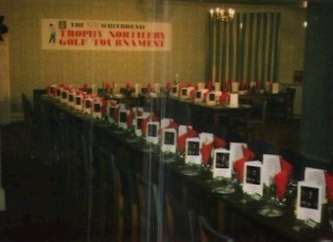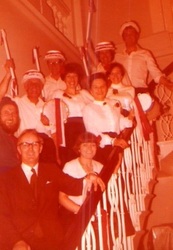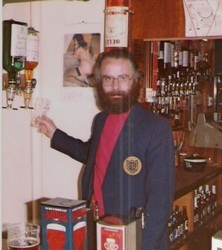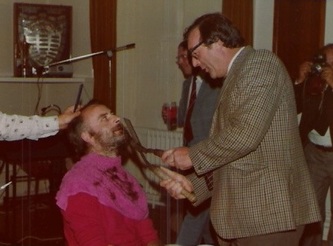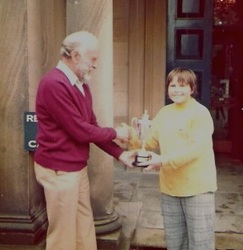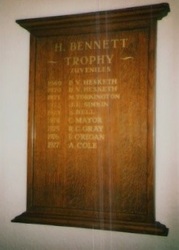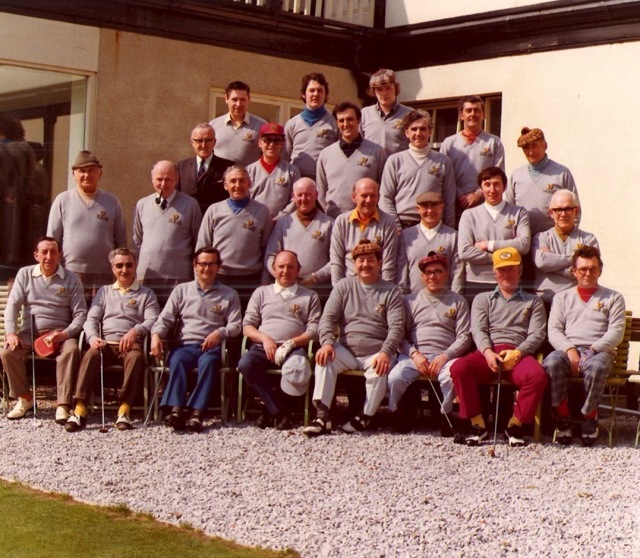The Golf Club Stewards Association is about to celebrate becoming one hundred years old this year and, as a former committee member, I was tracked down and invited to contribute a record of my own experiences for a book which is being compiled to mark the occasion.
Here it is - n.b. some smaller photos can be enlarged by 'clicking' on them.
A GOLF CLUB STEWARD'S TALE
In many respects, the golf industry has changed almost beyond recognition since I became a steward in the seventies. In particular, it has become more professional than it used to be and, whilst many clubs are still owned and administered by the members, an increasing number are being acquired or constructed by commercial enterprises who employ graduates in, for example, business or sports management to look after the investment of their shareholders. As a consequence, some golf club members have been reduced little more than customers.
Forty years ago, however, things were different.
Enthusiastic amateurs ran most clubs and the only qualification required to be a member of a greens committee was a passing relationship with a lawn-mower and, apart from retired businessmen who offered to 'look after the books' or an hotelier who 'knew a thing or two' about the licensed trade, very few committee members had the faintest idea of the responsibilities they assumed upon being elected.
Having said that, however, it wasn't just committee members whose suitability might be open to question because few golf club stewards, in those days, had previous experience in catering and, in that respect, I plead guilty as charged. Quite frankly, there was nothing in my background which had prepared me to become a steward. In a nutshell, for the best part of fifteen years since completing National Service, I had earned a living as a self-employed driving instructor and taxi proprietor. Mind you, the former taught me the rudiments of patience and, some might say, that would be a definite advantage for the task in hand.
Anyway, by the early seventies, I had been toying with the notion of becoming a pub landlord. At around the same time, for health reasons, I joined a golf club and, subsequently, become friendly with the professional at another club in The Peak District. Knowing that his club were looking for a new steward, he suggested that taking the position might be a sensible way for my wife and me to learn about the licensed trade at no expense to ourselves.
In those days, it was common in golf for the husband to be employed and paid by the club and for his wife to provide the catering on a self-employed basis and, very much to our surprise - bearing in mind our combined experience amounted to little more than part-time bar jobs - we were appointed to the position.
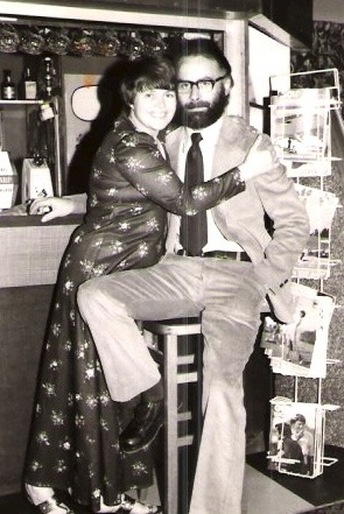
Here we are (left) on the 'wrong' side of the bar just after I had removed my wife's hands from around my throat - and, although it might not have seemed so at the time, a definite advantage of the situation in which we found ourselves was that we very quickly learned how to cope with every imaginable aspect of golf club stewardship. Over the next couple of years, since we were the only members of staff, my wife and I found ourselves attending to just about everything from unblocking overflowing urinals to serving lords of the realm.
To be perfectly honest, one would have to be pretty stupid not to be able to grasp the rudiments of what was required to run a bar; so, from my own point of view, the new environment presented few problems.
For my wife, however, the challenges were enormous. Although perfectly capable of laying on a few sandwiches and cakes for functions for the church or The Women's Institute, she had never actually prepared a dinner for more than three or four couples. However, within weeks of moving to the golf club, there were occasions when (in a kitchen little larger than a bus shelter) she would cater for over three hundred people at a time and - incredibly, she relied on simple mathematics to address the problem. In other words, she knew what was required to feed eight or ten people; so, she used straightforward multiplication to work out what was required for any more.
Fortunately, although the hours are long, the life of a steward doesn't have to be all work and no play. Traditionally, golf club employees are granted what is known as 'courtesy of the course' - which means that they can play golf without having to pay green fees. Furthermore, in much the same way that a visiting golf club captain, for example, might be offered this courtesy, stewards and greens staff might expect similar concessions at other golf courses.
Intriguingly, however, for a club whose membership was mainly what might be described as blue-collar, there were some who weren't at all happy that their steward was playing on their golf course. Even more intriguing was the fact that the most vehement objections emanated from what - in golfing vernacular - was an artisan element. Fortunately, they were in a minority and my family and I were allowed to play so long as the running of the clubhouse wasn't compromised.
A few months after moving to the club, a steward of a neighbouring club enquired if I would be interested in joining The Golf Club Stewards Association; a non profit-making organisation whose original purpose had been to provide benevolence for stewards and their dependants who may have suffered ill-health or fallen on hard times. Funds were accumulated by holding golf competitions and, although there were some national tournaments, the majority were organised and played on a regional basis.
These tournaments were played on Mondays (traditionally, the steward's day off) and were held throughout the summer months. Apart from an annual Individual Stroke-play competition, they were usually played to a four-ball Stableford format with each steward inviting a guest. Prizes were often donated by sponsors from the licensed trade (see below) and the host club captain was usually invited to play and be the guest-of-honour at a prize-presentation dinner in the evening. Not surprisingly, the host stewards and stewardesses were anxious to impress their peers; so, the meals were to a very high standard.
To be perfectly honest, one would have to be pretty stupid not to be able to grasp the rudiments of what was required to run a bar; so, from my own point of view, the new environment presented few problems.
For my wife, however, the challenges were enormous. Although perfectly capable of laying on a few sandwiches and cakes for functions for the church or The Women's Institute, she had never actually prepared a dinner for more than three or four couples. However, within weeks of moving to the golf club, there were occasions when (in a kitchen little larger than a bus shelter) she would cater for over three hundred people at a time and - incredibly, she relied on simple mathematics to address the problem. In other words, she knew what was required to feed eight or ten people; so, she used straightforward multiplication to work out what was required for any more.
Fortunately, although the hours are long, the life of a steward doesn't have to be all work and no play. Traditionally, golf club employees are granted what is known as 'courtesy of the course' - which means that they can play golf without having to pay green fees. Furthermore, in much the same way that a visiting golf club captain, for example, might be offered this courtesy, stewards and greens staff might expect similar concessions at other golf courses.
Intriguingly, however, for a club whose membership was mainly what might be described as blue-collar, there were some who weren't at all happy that their steward was playing on their golf course. Even more intriguing was the fact that the most vehement objections emanated from what - in golfing vernacular - was an artisan element. Fortunately, they were in a minority and my family and I were allowed to play so long as the running of the clubhouse wasn't compromised.
A few months after moving to the club, a steward of a neighbouring club enquired if I would be interested in joining The Golf Club Stewards Association; a non profit-making organisation whose original purpose had been to provide benevolence for stewards and their dependants who may have suffered ill-health or fallen on hard times. Funds were accumulated by holding golf competitions and, although there were some national tournaments, the majority were organised and played on a regional basis.
These tournaments were played on Mondays (traditionally, the steward's day off) and were held throughout the summer months. Apart from an annual Individual Stroke-play competition, they were usually played to a four-ball Stableford format with each steward inviting a guest. Prizes were often donated by sponsors from the licensed trade (see below) and the host club captain was usually invited to play and be the guest-of-honour at a prize-presentation dinner in the evening. Not surprisingly, the host stewards and stewardesses were anxious to impress their peers; so, the meals were to a very high standard.
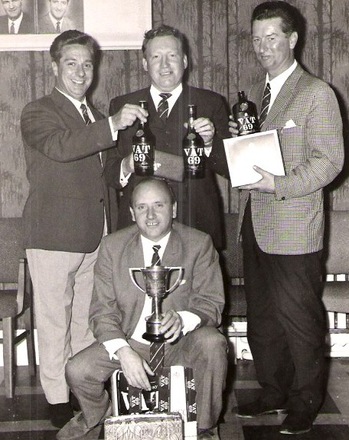
A couple of years after joining the association, I was asked to host one of the competitions at my club. By that time, my wife's cooking had gained a very good reputation and the big day seemed to go down quite well. Probably because of this, a few months later - when the steward of a much larger club in Lancashire was about to leave, one of their committee members (who had attended the competition at our club) asked if we would be interested in applying for the position.
Known as 'poaching', this was common practice by committee members in those days. From their point of view, it was a sensible method of employing people with a proven track-record and, for the stewards, it was quite appealing because the only way to gain 'promotion' within the industry was to move to a larger club and, putting aside a subconscious desire to be rid of the aforementioned artisan element, it seemed a sensible time to move. Apart from the attraction of managing a much larger club, the opportunity of an increased income couldn't be ignored. Furthermore, we had come to realise the prospect of remaining within golf offered a more attractive environment in which to raise our two sons than by the earlier ambition of owning a pub. So, we applied for and were accepted for the position.
The new environment (which has since become a country club) afforded myself the opportunity to learn more about the licensed trade; especially insofar as wines and spirits were concerned and the more sophisticated catering requirements - coupled with better facilities and the means to employ more staff - enabled my wife to broaden her skills considerably.
In addition to a fine course which attracted major competitions, a significantly larger clubhouse allowed the club to hold frequent social functions - morris dancing, for example - and during one of them, having allowed my beard to grow a little longer than usual, a sponsored shave raised quite a lot of money for charity (see below).
Known as 'poaching', this was common practice by committee members in those days. From their point of view, it was a sensible method of employing people with a proven track-record and, for the stewards, it was quite appealing because the only way to gain 'promotion' within the industry was to move to a larger club and, putting aside a subconscious desire to be rid of the aforementioned artisan element, it seemed a sensible time to move. Apart from the attraction of managing a much larger club, the opportunity of an increased income couldn't be ignored. Furthermore, we had come to realise the prospect of remaining within golf offered a more attractive environment in which to raise our two sons than by the earlier ambition of owning a pub. So, we applied for and were accepted for the position.
The new environment (which has since become a country club) afforded myself the opportunity to learn more about the licensed trade; especially insofar as wines and spirits were concerned and the more sophisticated catering requirements - coupled with better facilities and the means to employ more staff - enabled my wife to broaden her skills considerably.
In addition to a fine course which attracted major competitions, a significantly larger clubhouse allowed the club to hold frequent social functions - morris dancing, for example - and during one of them, having allowed my beard to grow a little longer than usual, a sponsored shave raised quite a lot of money for charity (see below).
Paradoxically, although most members at the new club were from a slightly more prosperous section of the community than the old club, I was rather surprised to find that there were still some who seemed obsessed with inverted-snobbery; however, courtesy of the course was never an issue. Both my sons were able to join the junior section and the elder one went on to become Junior Captain whilst the younger one won an important stroke-play competition (see below).
Coincidentally, my own golf was improving as well and I managed to win the previously mentioned stroke-play trophy with the Stewards Association - with whom I was becoming more involved. So much so, that I became a committee member and, soon afterwards, was elected Honorary Secretary for The North West section and, for the best part of two years, I thoroughly enjoyed arranging golf competitions and various social functions throughout the region.
From the golfing point of view, this meant establishing which stewards were willing to host a tournament and then seeking permission to play their course. This rarely caused a problem because the steward will usually have 'sounded-out' his Club Secretary. However, there was still a lot of correspondence involved and, at the tournaments themselves, collecting entry-fees and issuing cards kept me busy and, after playing in the competition, acting as Master of Ceremonies during the evening was also pretty time-consuming - but rewarding. In addition to the regional responsibilities, I also attended meetings of the national association, became a regular contributor to the association's magazine, and was involved with the administration of the association's marquee during The Open.
It was a couple of resourceful members of the national committee who concocted the idea of a Golf Club Steward's Association marquee at The Open and they had approached the R & A who seemed quite enthusiastic. In 1976, at Royal Birkdale, the concept was put into practice and it has progressed to become a prominent feature of the tented village since then. Although I didn't contribute towards the operation of that opening venture, my parents lived in Southport, so my younger son stayed with then for the week and walked to the golf course each day to help out as much as a thirteen-year-old could.
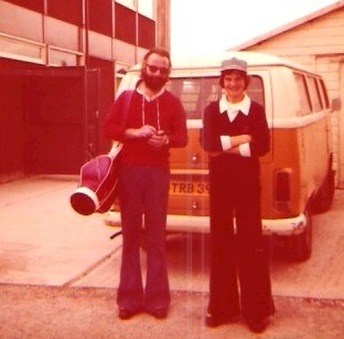
Conveniently, for almost all of the time I was a steward, I owned VW camper vans (see right with elder son and myself outside the rather unimposing clubhouse at our first club) and, for the three years from 1977 to 1979 - along with my sons (and friends) - we parked alongside the marquee during The Open and acted as caretakers at night and general dogsbodies during the day.
It's difficult to remember exactly how many well-known golfers and personalities we met during those exciting times; however, my younger son collected the autographs of several - including Seve Ballesteros, Nick Faldo, Johnny Miller, Gary Player and Jack Nicklaus. For my part, I met the likes of Arnold Palmer, Henry Cotton, Harry Carpenter, and Henry Cooper - in addition to serving drinks to many other equally fascinating characters.
Returning to ordinary mortals, in addition to our regional competitions, the North West section held what was billed as an 'International' match against The Scottish Clubmasters Association (a north-of-the-border version of The Golf Club Stewards Association). The event was sponsored by major companies such as Piccadilly Cigarettes and Harp Lager and the venues alternated between the two countries.
The earliest one I attended was at Glenbervie Golf Club and, from a personal point of view, was memorable because it was the first time I had experienced Scottish hospitality. As a consequence of that, there's very little about it that I can remember. Suffice to say, I must have enjoyed the occasion because when asked if the event could be held at my club, I was happy to accept the challenge.
Here is the north west team at one of the matches..........
It's difficult to remember exactly how many well-known golfers and personalities we met during those exciting times; however, my younger son collected the autographs of several - including Seve Ballesteros, Nick Faldo, Johnny Miller, Gary Player and Jack Nicklaus. For my part, I met the likes of Arnold Palmer, Henry Cotton, Harry Carpenter, and Henry Cooper - in addition to serving drinks to many other equally fascinating characters.
Returning to ordinary mortals, in addition to our regional competitions, the North West section held what was billed as an 'International' match against The Scottish Clubmasters Association (a north-of-the-border version of The Golf Club Stewards Association). The event was sponsored by major companies such as Piccadilly Cigarettes and Harp Lager and the venues alternated between the two countries.
The earliest one I attended was at Glenbervie Golf Club and, from a personal point of view, was memorable because it was the first time I had experienced Scottish hospitality. As a consequence of that, there's very little about it that I can remember. Suffice to say, I must have enjoyed the occasion because when asked if the event could be held at my club, I was happy to accept the challenge.
Here is the north west team at one of the matches..........
Once again, it seems we (especially my wife's catering skills) made a pretty good impression because, a few weeks later, I was invited to apply for a much-coveted (although I didn't know it, at the time) position at the ninth oldest golf club in the world. So, after a process which involved two lengthy journeys and two equally lengthy interviews, almost exactly two years after moving from The Peak District to Lancashire, we moved even further north. Although the contract said "Clubhouse Manager of The Glasgow Golf Club", I was happy to be known as Clubmaster. My wife, on the other hand, was rather less impressed and was anxious for it to be made quite clear that Clubmistress was only one word.
We stayed in Glasgow for eight very happy years - enjoying an environment which, having been established in 1787, maintained standards based on centuries of tradition. The respect shown towards the staff was a marked contrast to our earlier experiences; however, it was an extremely demanding position and when, once again, we were invited to consider another move, we had to put sentiment aside. The prospect of running an almost as prestigious but significantly less busy club was beguiling and a 'promotion' to Manager was also an inducement and we moved to the Ayrshire coast and, to some extent, reached the pinnacle of our career by hosting a Final Qualifying Round of The Open in 1986.
Sadly (in many ways) during the following year, I was persuaded to leave the golf industry; paradoxically (bearing in mind the reason we joined the game in the first place) to become a pub landlord in The Peak District. Even more intriguing, was the fact that the man who invited us to move back to England was the former golf club captain who had been the very first to employ me as a golf club steward fourteen years previously.
EPILOGUE
Although I can't deny feeling occasionally aggrieved by certain experiences during my early years as a golf club steward, it was only whilst doing some research before putting this record together that I realised how much I may have been affected by them. I had forgotten that I had written articles in the stewards' magazine which suggested, for example, that some members looked upon (and treated) stewards as little more than glorified bartenders.
Certainly, my own experience (particularly in the first club) was testimony to the fact that there were definitely members of golf clubs who resent members of staff being afforded courtesy of the course and, at the second club, there were elements who imagined they were the employer and the member of staff was the employee.
However, having made these observations, my own feelings - believe it or not - were to feel a certain amount of sympathy towards the individuals concerned because, in almost all cases, there seemed to be an explanation for their behaviour. Put bluntly, they were, at best, under-achievers and, at worst, failures. Furthermore, I suspect that many of those who seek to become members of a golf club committee do so to compensate for a failure to make the grade at work. This could go some way towards explaining the employer/employee scenario.
Whatever the reasons, I never experienced these issues again after moving north of the border.
At the time, I presumed this was a consequence of the gulf between the social and economic status of the memberships of the particular clubs with which I had been involved. In football terms, the English clubs came from the lower divisions whereas the Scottish ones were Premier League.
Interestingly, I've recently discussed the subject with another former steward who moved from the north west (to the southern counties, in his case) and his experience had been very similar to my own. So - and I say this as someone who was born in the north west - perhaps the problem (if there is a problem and not a figment of my imagination) might be a regional one.
